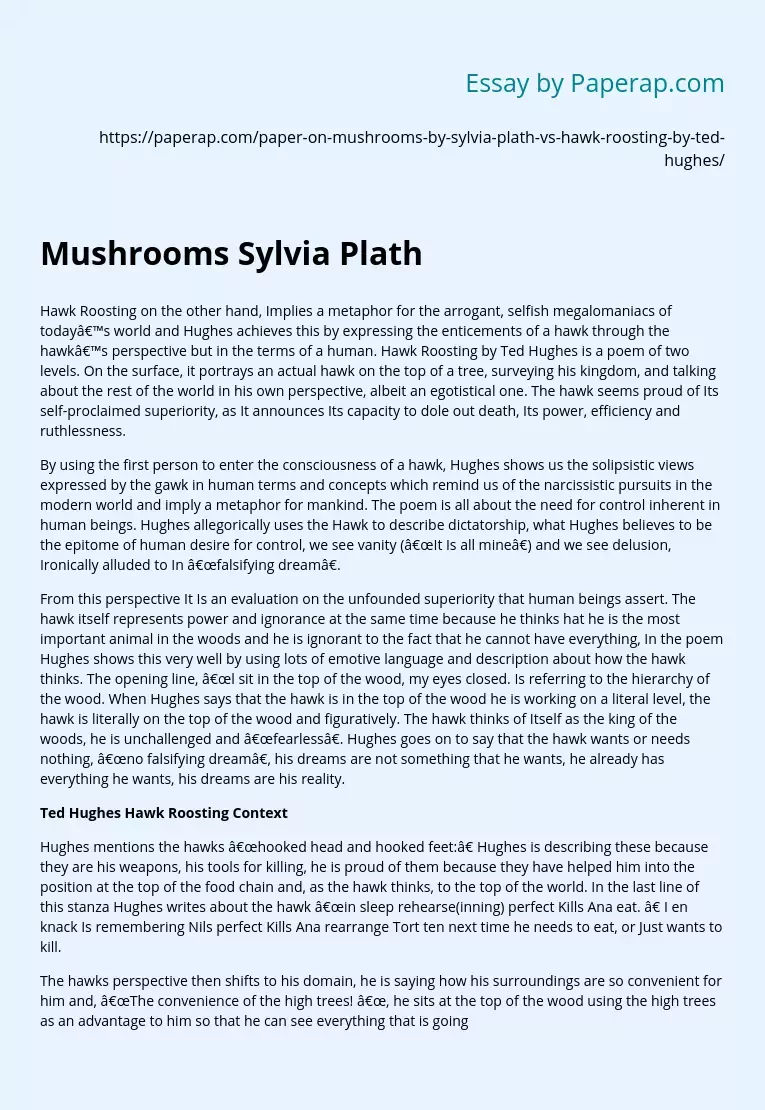Mushrooms Sylvia Plath
Hawk Roosting on the other hand, Implies a metaphor for the arrogant, selfish megalomaniacs of today’s world and Hughes achieves this by expressing the enticements of a hawk through the hawk’s perspective but in the terms of a human. Hawk Roosting by Ted Hughes is a poem of two levels. On the surface, it portrays an actual hawk on the top of a tree, surveying his kingdom, and talking about the rest of the world in his own perspective, albeit an egotistical one.
The hawk seems proud of Its self-proclaimed superiority, as It announces Its capacity to dole out death, Its power, efficiency and ruthlessness.
By using the first person to enter the consciousness of a hawk, Hughes shows us the solipsistic views expressed by the gawk in human terms and concepts which remind us of the narcissistic pursuits in the modern world and imply a metaphor for mankind. The poem is all about the need for control inherent in human beings.
Hughes allegorically uses the Hawk to describe dictatorship, what Hughes believes to be the epitome of human desire for control, we see vanity (“It Is all mine”) and we see delusion, Ironically alluded to In “falsifying dream”.
From this perspective It Is an evaluation on the unfounded superiority that human beings assert. The hawk itself represents power and ignorance at the same time because he thinks hat he is the most important animal in the woods and he is ignorant to the fact that he cannot have everything, In the poem Hughes shows this very well by using lots of emotive language and description about how the hawk thinks.
The opening line, “l sit in the top of the wood, my eyes closed. Is referring to the hierarchy of the wood. When Hughes says that the hawk is in the top of the wood he is working on a literal level, the hawk is literally on the top of the wood and figuratively. The hawk thinks of Itself as the king of the woods, he is unchallenged and “fearless”. Hughes goes on to say that the hawk wants or needs nothing, “no falsifying dream”, his dreams are not something that he wants, he already has everything he wants, his dreams are his reality.
Ted Hughes Hawk Roosting Context
Hughes mentions the hawks “hooked head and hooked feet:” Hughes is describing these because they are his weapons, his tools for killing, he is proud of them because they have helped him into the position at the top of the food chain and, as the hawk thinks, to the top of the world. In the last line of this stanza Hughes writes about the hawk “in sleep rehearse(inning) perfect Kills Ana eat. ” I en knack Is remembering Nils perfect Kills Ana rearrange Tort ten next time he needs to eat, or Just wants to kill.
The hawks perspective then shifts to his domain, he is saying how his surroundings are so convenient for him and, “The convenience of the high trees! “, he sits at the top of the wood using the high trees as an advantage to him so that he can see everything that is going on beneath him. The last line of the poem shows that the hawk thinks it is more important then the Earth itself, the hawk seems to think that the Earth is subservient to him. This climaxes the poem with the most solipsistic claim and rounds off the impression of a greedy, power-crazed yet sadly ignorant creature.
In contrast, Mushrooms by Sylvia Plant has a possible underlying metaphor for women’s place in society. Plant was herself a feminist and although she never stated that this was the true meaning of the poem, it seems fairly likely. Plant conjures up the image of a field of mushrooms, silently growing overnight, undetected and unnoticed, almost like a silent rebellion at the end of which they will rule the world. In contrast, Hughes’ hawk in Hawk Roosting believes that he is already in a state of supreme power, and is not silent about it, but arrogantly flaunts his power.
Plant portrays the mushrooms as a unit, as though they are all bound together by their cause, and to back this up she talks in the 1st person plural: “Nobody sees us, Stops us, betrays us” This enhances the image of a silent group all working as one to overthrow the oppressive regime. In contrast, the hawk is an entirely reclusive being, that feels no need for any companions, and Hughes, similarly to Plant, speaks entirely in the first errors singular.
In the 4th stanza, Plant uses alliteration and internal rhyme: “Soft fists insist on heaving the needles, the leafy bedding” This is onomatopoeic as the repeated ‘s’ sound is like the sound of mushrooms tearing through the earth and sprouting upwards. Contrastingly, Hughes chooses not to use a regular rhyme pattern, but instead uses emotive language for effect. Plant continues with the metaphor for women’s position in society as she says: “We diet on water, on crumbs of shadow, bland-mannered, asking little or nothing. This lays up to the stereotype of the standard housewife of the times. In the sass’s women were still playing quite a subservient role in society to men and Plant clearly objected to this, and voiced her objections through poetry. During that passage, Plant also uses enjambment to establish an increasing sense of cumulative energy between stanzas. Boot Plant Ana Hughes nave nature as tenet DSSSL topic In tense poems, out It Is TN meaning under the surface that is important, and that is what affects how they portray nature through the use of language and perspective. Phillips ME ROD-C
Mushrooms Sylvia Plath. (2019, Dec 05). Retrieved from https://paperap.com/paper-on-mushrooms-by-sylvia-plath-vs-hawk-roosting-by-ted-hughes/

